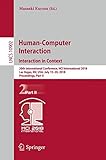Human-Computer Interaction. Interaction in Context [electronic resource] : 20th International Conference, HCI International 2018, Las Vegas, NV, USA, July 15-20, 2018, Proceedings, Part II / edited by Masaaki Kurosu.
Contributor(s): Kurosu, Masaaki [editor.] | SpringerLink (Online service)
| SpringerLink (Online service) .
.
Material type:  BookSeries: Information Systems and Applications, incl. Internet/Web, and HCI: 10902Publisher: Cham : Springer International Publishing : Imprint: Springer, 2018Edition: 1st ed. 2018.Description: XIX, 663 p. 303 illus. online resource.Content type: text Media type: computer Carrier type: online resourceISBN: 9783319912448.Subject(s): User interfaces (Computer systems)
BookSeries: Information Systems and Applications, incl. Internet/Web, and HCI: 10902Publisher: Cham : Springer International Publishing : Imprint: Springer, 2018Edition: 1st ed. 2018.Description: XIX, 663 p. 303 illus. online resource.Content type: text Media type: computer Carrier type: online resourceISBN: 9783319912448.Subject(s): User interfaces (Computer systems)HCI in medicine -- Usability Evaluation of Origin of Replication Finding Tools -- Development of Wireless Surgical Knife Attachment with Proximity Indicators Using ArUco Marker -- Accurate Evaluation of Rotational Angle and Translation Movement of Our Organ-following Algorithm based on Depth-Depth Matching -- A Useful Robotic-Mechanical System for Measuring a Surgical Area without Obstructing Surgical Operations by Some Surgeon -- A Novel Liver Surgical Navigation System Using Polyhedrons with STL-format -- Calibration Experiences of Multiple RGB/Depth Visions for Capturing a Surgical Area -- Research of a m-Health App Design for Information Management of MDTMs -- Laparoscopic Forceps with Force Feedback -- HCI for health and wellbeing -- Bringing nature into our lives - Using biophilic design and calm computing principles to improve well-being and performance -- Social Robotics and Human Computer Interaction for Promoting Wellbeing in the Contemporary City -- Interactive stress-free toy design for students studying overseas -- Assessing Patient Needs for the Enhancement of Stroke Rehabilitation Services: A Customer Value Perspective -- Towards Encouraging a Healthier Lifestyle and Increased Physical Activity - an App incorporating Persuasive Design Principles -- User Acceptance Factors for mHealth -- Healthy Hankerings: Motivating Adolescents to Combat Obesity with a Mobile Application -- Research on Office Chair based on Modern Office Posture -- Eudaimonic Gamification to Engage Cancer Patients in Positive Coping Strategies -- Sports IT and Digital Wellness: Three waves of digital transformation in sports and training -- An Innovative Mattress Design to Improve Sleep Quality and Thermal Comfort -- HCI in cultural heritage -- Interaction and Interactivity: in the context of digital interactive art installation -- Towards Cross-Generational System Design -- Exploring Technology Use in Dance Performances -- From Interpretation to Deduction: A Study on the Experience Design Method of Digitized Communication of Cultural Heritage -- Bias in Perception of Art Produced by Artificial Intelligence -- Research on Personalized Learning Pattern in Cantonese Porcelain using Augmented Reality: A Case Study of Cantonese Porcelain -- An Essay about the impact of the Digital Revolution on Higher Education in Art and Design -- The Application of Augmented Reality Technology in Digital Display for Intangible Cultural Heritage: The Case of Cantonese Furniture -- HCI in complex environments -- Navigation for Visually Impaired Using Haptic Feedback -- Supporting Collaboration in Human-Machine Crisis Management Networks -- Evaluating Effects of Hand Pointing by an Image-based Avatar of a Navigation System -- Using Convolutional Neural Networks for Assembly Activity Recognition in Robot Assisted Manual Production -- CoRgI: Cognitive Reasoning Interface -- Difficulties Implementing Big Data: A Big Data Implementation Study -- Mobility as a Service (MaaS) Based on Intermodal Electronic Platforms in Public Transport -- From HMI to HRI: Human-Vehicle Interaction Design for Smart Cockpit -- Implementing Node-Link Interface into a Block-Based Visual Programming Language -- Development of Holographic Environment for Multi-User Virtual Robot Training System -- Mobile and Wearable HCI -- Investigating Users' Experiences and Attitudes towards Mobile Apps' Reviews -- Are People Polite to Smartphones? How Evaluations of Smartphones Depend on Who Is Asking -- Pink Stinks - at Least for Men - How Minimal Gender Cues Affect the Evaluation of Smartphones -- Investigating the Behavior of Sequence Typing on the Mobile Devices -- Interactive Public Displays for Paperless Mobility Stations -- Sencogi Spatio-Temporal Saliency: a New Metric for Predicting Subjective Video Quality on Mobile Devices -- Improving Mobile User Experience of New Features through Remote Tests and Evaluation -- What Drives the Perceived Credibility of Mobile Websites: Classical or Expressive Aesthetics?.-A Study of Applying Slow Technology on Wearable Devices -- Experience Maps for Mobility -- Analyzing Impact Factors for Smartphone Sharing Decisions Using Decision Tree -- A Lifelog Viewer System Supporting Multiple Memory Cues -- Defining a Model for Development of Tactile Interfaces on Smartphones.
The 3 volume-set LNCS 10901, 10902 + 10903 constitutes the refereed proceedings of the 20th International Conference on Human-Computer Interaction, HCI 2018, which took place in Las Vegas, Nevada, in July 2018. The total of 1171 papers and 160 posters included in the 30 HCII 2018 proceedings volumes was carefully reviewed and selected from 4346 submissions. HCI 2018 includes a total of 145 papers; they were organized in topical sections named: Part I: HCI theories, methods and tools; perception and psychological issues in HCI; emotion and attention recognition; security, privacy and ethics in HCI. Part II: HCI in medicine; HCI for health and wellbeing; HCI in cultural heritage; HCI in complex environments; mobile and wearable HCI. Part III: input techniques and devices; speech-based interfaces and chatbots; gesture, motion and eye-tracking based interaction; games and gamification.


There are no comments for this item.